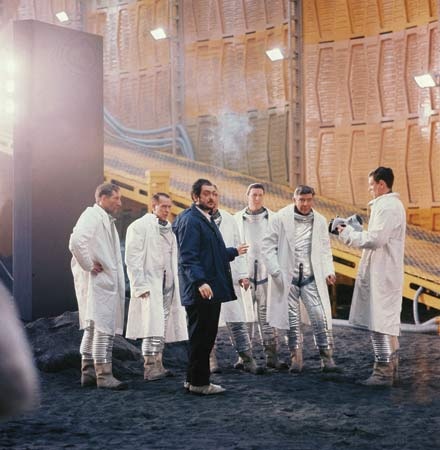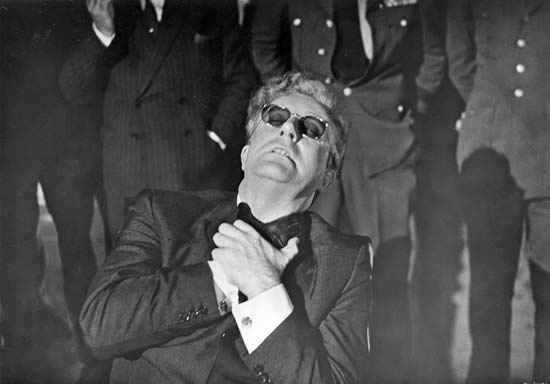Kubrick, Stanley
American director
born July 26, 1928, New York, New York, U.S.
died March 7, 1999, Childwickbury Manor, near St. Albans, Hertfordshire, England
 American motion-picture director and writer whose films are characterized by a cool, formal visual style, meticulous attention to detail, and a detached, often ironic pessimism.
American motion-picture director and writer whose films are characterized by a cool, formal visual style, meticulous attention to detail, and a detached, often ironic pessimism.Having become interested in photography in high school, Kubrick became a staff photographer for Look magazine at age 17. His first film, The Day of the Fight (1951), is a short documentary about the boxing world. His first feature-length film, Fear and Desire (1953), dealt with World War II.
 Paths of Glory (1957), a story of military injustice in the French army during World War I, brought Kubrick into prominence as a director. It was followed by films, mostly shot in England, that explored the incongruities and violence underlying modern life and reached imaginatively into the world of the future. After Spartacus (1960), a historical epic, Kubrick made Lolita (1962), based on the novel by Vladimir Nabokov (Nabokov, Vladimir); Dr. Strangelove or: How I Learned to Stop Worrying and Love the Bomb (1964), which turned the possibility of a nuclear war into a grim joke; 2001: A Space Odyssey (1968), which earned an Academy Award for special visual effects; A Clockwork Orange (1971), based on the dystopian novel by Anthony Burgess (Burgess, Anthony); Barry Lyndon (1975), based on William Makepeace Thackeray (Thackeray, William Makepeace)'s novel of manners; The Shining (1980), a horror film based on the novel by Stephen King; Full Metal Jacket (1987), about the Vietnam War; and the posthumously released Eyes Wide Shut (1999), an exploration of marital fidelity and sexuality.
Paths of Glory (1957), a story of military injustice in the French army during World War I, brought Kubrick into prominence as a director. It was followed by films, mostly shot in England, that explored the incongruities and violence underlying modern life and reached imaginatively into the world of the future. After Spartacus (1960), a historical epic, Kubrick made Lolita (1962), based on the novel by Vladimir Nabokov (Nabokov, Vladimir); Dr. Strangelove or: How I Learned to Stop Worrying and Love the Bomb (1964), which turned the possibility of a nuclear war into a grim joke; 2001: A Space Odyssey (1968), which earned an Academy Award for special visual effects; A Clockwork Orange (1971), based on the dystopian novel by Anthony Burgess (Burgess, Anthony); Barry Lyndon (1975), based on William Makepeace Thackeray (Thackeray, William Makepeace)'s novel of manners; The Shining (1980), a horror film based on the novel by Stephen King; Full Metal Jacket (1987), about the Vietnam War; and the posthumously released Eyes Wide Shut (1999), an exploration of marital fidelity and sexuality.- Sesson Shūkei
- sestina
- Sesto San Giovanni
- Sete Lagoas
- Seth
- Seth Barnes Nicholson
- Seth Carlo Chandler
- Seth Low
- Seth Thomas
- Seth, Vikram
- Seti I
- Seti II
- Seto
- Seto Great Bridge
- Seto-guro ware
- Seton, Anya
- Seton, Ernest Thompson
- Seton, George Seton, 5th Lord
- Seton Hall University
- Seton, Saint Elizabeth Ann
- Setouchi
- Seto ware
- Settat
- settee
- setter